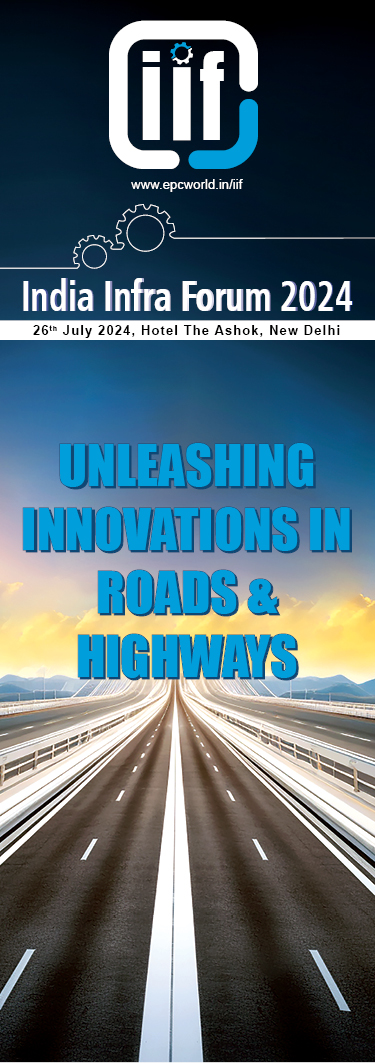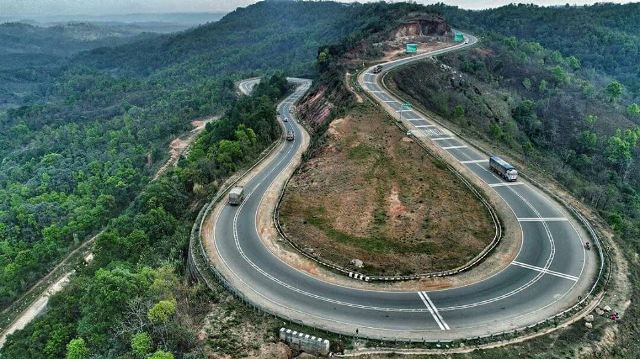by Raj Kumar, CMD, Rodic Consultants
Roads and highways are an indispensable lifeline of any nation, facilitating the shipment of essential supplies and the movement of people and commodities, among others. In a world disrupted by the coronavirus pandemic in 2020, rapid construction of roads and highways in 2021 would represent one of the ideal opportunities for the nation and its economy to bounce back strongly.
Opportunities and Outlays
With India’s total road network comprising around 5.89 million kilometers, this makes it the world’s second-largest road network.Growing industrial activities backed by a rising number of two- and four-wheelers have supported the steady growth of infrastructure projects in road transport.
Recognising the crucial role of infrastructure development in augmenting economic growth, the Centre has introduced measures encouraging greater growth in the industry. Simultaneously, the Government of India (GoI) has been promoting policies for more private sector participation. Not surprisingly, the public-private partnership (PPP) model has boosted the pace of roads and highways construction across India.
Since the GoI permits 100% FDI in roads, opportunities abound for domestic and foreign players to capitalise on this through partnerships. Between April 2000 and March 2020, the cumulative FDI in construction development was $25.66 billion. A reduction in GST on construction equipment from 28% to 18% is another enabling factor.
Moreover, under the National Infrastructure Pipeline (NIP) for FY2019-25, the GoI has allocated $1.4 trillion (Rs111 lakh crore). Of this, major investments are planned in the energy, urban, roads and railways sectors. Between FY2019-25, the roads sector is expected to account for 18% of this capital expenditure. Emphasising the industry’s importance, the Centre had earmarked $13.14 billion (Rs91,823 crore) for the Ministry of Road Transport and Highways in the Union Budget 2020-21. In the next five years, the GoI aims to invest $214.62 billion (Rs15 lakh crore).
Significantly, rural regions have seen considerable socio-economic gains through the Pradhan Mantri Gram Sadak Yojana (PMGSY). As a result, the Centre had allocated $2.79 billion (Rs19,500 crore) under PMGSY. In tandem, the GoI approved the launch of PMGSY phase III at an expected cost of $11.48 billion (Rs80,250 crore) to revamp and widen 125,000 km of roads within five years. Additionally, 30,000 km of roads under PMGSY are planned to be constructed using waste plastic and green and cold-mix technology to lower the carbon footprint of these activities.
Considering all the above factors and against the backdrop of COVID-19 disruptions in construction last year, the industry is hopeful of hiked allocations in the upcoming Union Budget 2021-22.
As mentioned earlier, infrastructure is vital for the country’s socio-economic development. Lack of adequate pan-India infrastructure signifies a tremendous opportunity for construction companies. Though the Centre adheres to the traditional bidding approach in awarding projects, evaluating and assessing the contractors' capabilities is imperative to certify quality, cost efficiency and on-time delivery.
Digital Drive and Deliveries
For infrastructure projects in the country, it should be noted that EPC (Engineering, Procurement and Construction) is the best model. But to ascertain strong success under EPC, Schedule H needs to be amended so that the cash flow of contractors is maintained in a manner whereby progress is attained according to the contract schedule. Meanwhile, instead of Schedule H, the Centre has allowed relaxation in payments as per the actual execution of works, including performance security and retention of money.
To determine that infra projects remain on track and move as per schedule, contractors must hire the right kind of staff. There should be absolute dedication to project completion schedules, all within the predetermined budgets, timeframe and the quality outlined in the contract.
Timely implementation continues to be one of the biggest barriers in India. Fortunately, the Union Minister for Road Transport & Highways Shri Nitin Gadkari intends to promote greater efficiencies in road construction. Accordingly, the NHAI (National Highways Authority of India) is poised to become India’s first public sector construction organisation to go completely digital via cloud-based software.
Besides limiting cumbersome administrative processes, it will promote more transparency in NHAI’s operations. For instance, the software will track files and identify officials delaying approval of the files unduly. ShriGadkari has already warned that delayed decision-making will not be tolerated any longer as it incurs losses.
Also, NHAI is keen on deploying new technologies to reduce the cost of construction. The new AI-enabled technology would help in minimising disputes since it keeps tracking and checking all relevant issues such as land acquisition delays and other constraints. Transparency in all these actions will help in making sure work is undertaken within stipulated deadlines. Such steps will improve efficiency and transparency in the construction of highways, auguring the sector in 2021.
Having a total length of about 1.32 lakh km, national highways serve as the nation’s arterial network. Although national highways comprise only around 2% of India’s road network, they carry 40% of its total road traffic.NHAI’s role in developing, maintaining and managing national highways is vital for the seamless interstate movement of goods and passenger traffic. Consequently, increasing its operations' efficiency is critical to make sure the Government’s ambitious targets for faster construction of roads and highways are realised.
Highways to Progress
As the country moves ahead into 2021, the focus is on a sustained economic turnaround that helps in higher employment generation. Infrastructure is one such sector that can help boost economic activity and benefit almost all industries across the spectrum. Undoubtedly, a strong project pipeline and varied supportive steps by the Central and State Governments can facilitate a speedier turnaround.
Many policies are been worked upon by the Government to attract investors and 2,00,000 km of national highways is expected to be completed by 2022.
Rating agency ICRA projects a ‘stable’ outlook for the construction industry, noting that investments under the NIP would be key growth drivers.It states that while project execution was severely hit earlier because of the nationwide lockdown, supply-chain constraints and reverse migration of labour, these issues have largely been managed.
It also affirms that in the past few months, the Center announced a series of relief measures to support the sector. These include relaxations in earnest money deposit, bidding eligibility criteria and performance security as well as increased frequency of government tender payments.
Given the large pipeline of projects in infrastructure waiting to be awarded as per the NIP, new order inflows will continue being vibrant for construction companies in the current fiscal, going by ICRA’s expectations. Finally, the agency mentions that a major portion of the sharp rise in infrastructure investments via NIP will go towards roads, railways, other transportation, and power and urban infrastructure.
We at Rodic are also continuously working towards improvising our deliveries in Roads and Highways by providing value engineering to Clients through innovative ideas and striving for continual improvement in technology and its effective implementation considering safeguarding the environment and social upliftment of the society. Providing high-class engineering and engineering staff committed to quality works with project completion in stipulated time frame and within budget and maintaininga cordial relationship with Contractor, Client and developing harmony with the locals.
Taking all these factors into account, there’s no doubt that 2021 will mark an inflexion point for India’s economic turnaround – helped majorly by the accelerated development of roads and highways across the country.






